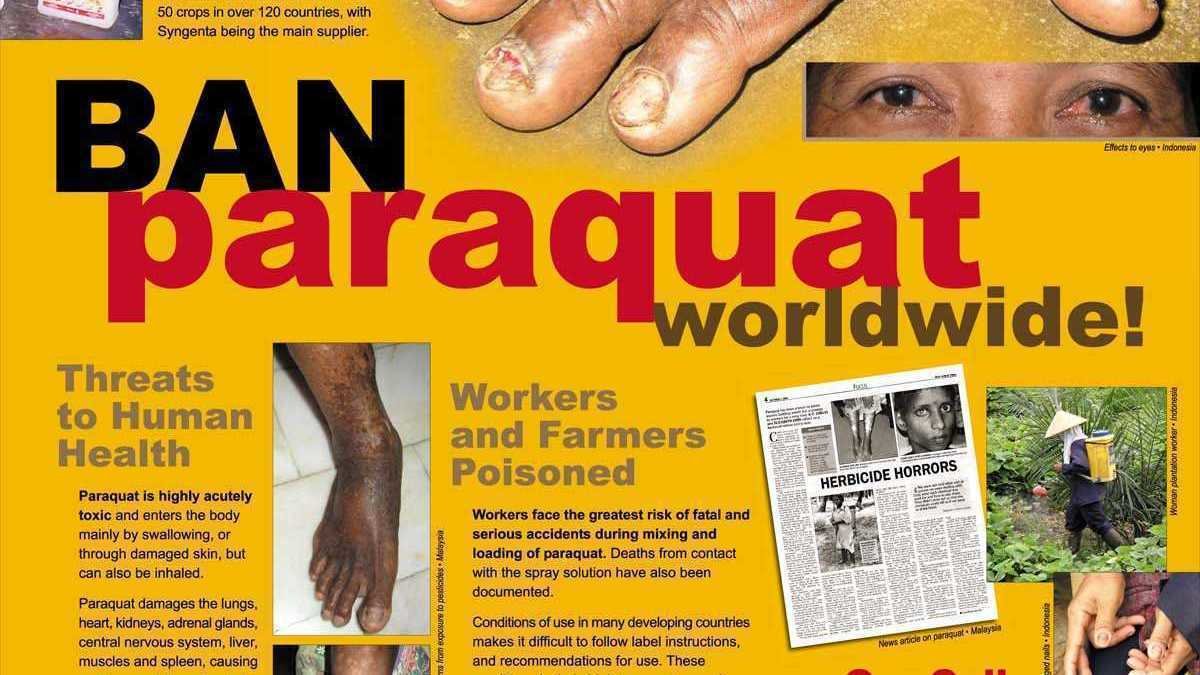Syngenta, déterminée à maintenir son produit-phare à base de paraquat sur le marché en faisant des milliers de morts
*****
Syngenta, hotărâtă să își păstreze produsul emblematic paraquat pe piață, ucigând mii
*****
Syngenta, determined to keep its flagship paraquat product in the market by killing thousands
Le paraquat vendu par Syngenta est l’un des pesticides les plus vieux et les plus toxiques au monde. Des centaines de documents internes obtenus par Public Eye et Unearthed racontent l’irresponsabilité chronique d’une société agrochimique déterminée à maintenir son herbicide sur le marché, en dépit des dizaines de milliers de morts.
Warunika n’avait que seize ans lorsqu’elle a avalé une gorgée d’une vieille bouteille de l’herbicide Gramoxone trouvée dans la maison familiale. Ses parents en ont la certitude : leur fille ne voulait pas mourir.
Fâchée après une dispute avec son frère, l’adolescente a attrapé la bouteille et bu au goulot. « Voilà, j’ai avalé ça ! », a-t-elle crié à sa maman. « Elle a fait ça pour me faire peur », explique Kumarihami.
Warunika est décédée à l’hôpital le jour suivant.
Ses parents, de petits agriculteurs vivant au nord du Sri Lanka, utilisaient ce produit pour désherber leurs rizières. C’était du Gramoxone, une formule concentrée de paraquat, l’un des herbicides les plus toxiques au monde.
Jon Heylings, toxicologue et lanceur d’alerte, a été responsable pendant plus de 20 ans de la sécurité des produits à base de paraquat, l’un des pesticides les plus vieux et les plus toxiques au monde. Aujourd’hui, il témoigne de l’irresponsabilité de Syngenta, déterminée à maintenir son produit-phare sur le marché.
__________________________
Paraquatul vândut de Syngenta este unul dintre cele mai vechi și mai toxice pesticide din lume. Sute de documente interne obținute de Public Eye și Unearthed spun despre iresponsabilitatea cronică a unei companii agrochimice hotărâtă să-și păstreze erbicidul pe piață, în ciuda a zeci de mii de decese.
Warunika avea doar șaisprezece ani când a sorbit dintr-o sticlă veche de erbicid Gramoxone găsită în casa familiei. Părinții ei sunt siguri că fiica lor nu a vrut să moară.
Tulburată după o ceartă cu fratele ei, adolescenta a luat sticla și a băut. „Uite, am înghițit asta! Ea a țipat la mama ei. „A făcut asta pentru a mă speria”, explică Kumarihami.
Warunika a murit în spital a doua zi.
Părinții săi, mici fermieri care trăiesc în nordul Sri Lanka, au folosit acest produs pentru a-și înlătura orezurile. A fost Gramoxone, o formulare concentrată de paraquat, unul dintre cele mai toxice erbicide din lume.
Jon Heylings, toxicolog și denunțător, este responsabil de peste 20 de ani pentru siguranța produselor fabricate cu paraquat, unul dintre cele mai vechi și mai toxice pesticide din lume. Astăzi, el vorbește despre iresponsabilitatea Syngenta, hotărâtă să-și păstreze produsul emblematic pe piață.
________________________
Paraquat sold by Syngenta is one of the oldest and most toxic pesticides in the world. Hundreds of internal documents obtained by Public Eye and Unearthed tell of the chronic irresponsibility of an agrochemical company determined to keep its herbicide on the market, despite tens of thousands of deaths.
Warunika was only sixteen when she took a sip from an old bottle of Gramoxone herbicide found in the family home. Her parents are sure that their daughter did not want to die.
Angry after an argument with her brother, the teenager grabbed the bottle and drank. « There you go, I swallowed that! She shouted at her mom. “She did this to scare me,” Kumarihami explains.
Warunika died in hospital the next day.
His parents, small farmers living in northern Sri Lanka, used this product to weed their rice fields. It was Gramoxone, a concentrated formulation of paraquat, one of the most toxic herbicides in the world.
![]()
